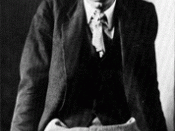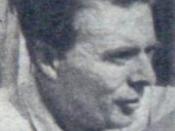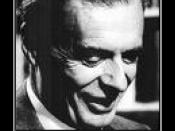The novel Brave New World, by Aldous Huxley outlines many fears of the futuristic world, and their impact on society. Aldous Huxley is not as positive, and in fact rather pessimistic about the direction that various aspects of society could progress too. Initially, Huxley claims there would be no reason to ban a book, for there would be no one who would indulge in reading one. Huxley also believes that so much would be given to society, that this society would be reduced to passivity and egoism. Also, Huxley thought the truth would be drowned in a sea of irrelevance. Huxley was also certain of society becoming a trivial culture. If one considers Huxley's fears and prophecies, one may come to the realization, that this futuristic world would have the potential to lead to a downfall of mankind.
In the novel Brave New World, it is believed that there would be no reason to ban books, as no one would indulge in reading them.
The world controllers feared that there was a risk of an individual reading material which might undesirably decondition one of the reader's reflexes. To prevent this tragedy there is neo-pavlovian conditioning, where babies are trained to like or dislike certain objects, through a system of rewards and punishment. This can be seen in the social pre-destination room, where infants are subject to electric stimulus and scared with loud noises as they begin to enjoy playing with books and flowers. As the director of hatcheries finishes demonstrating this lesson to students he explains "They'll grow up with what the psychologists used to call an 'instinctive' hatred of books and flowers... They'll be safe from books and botany all their lives." (Pg. 29). Through this hatred one develops of books, it is understandable why there is...


